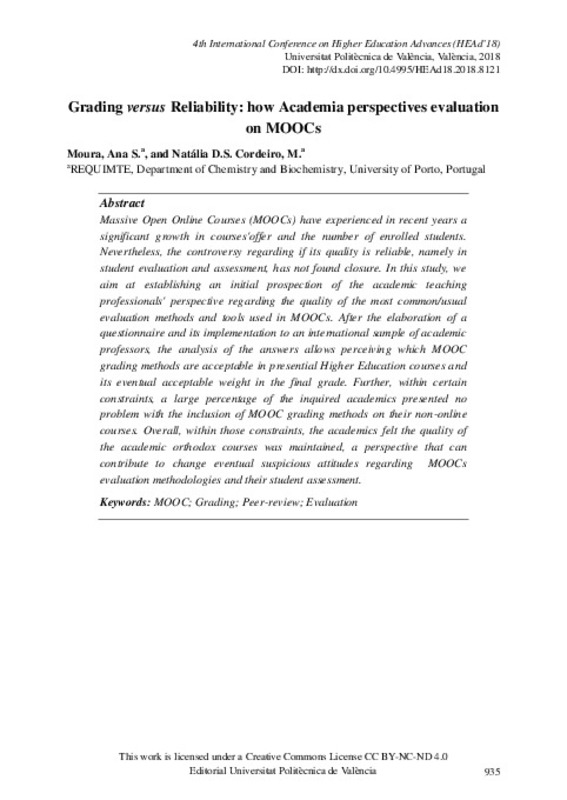JavaScript is disabled for your browser. Some features of this site may not work without it.
Buscar en RiuNet
Listar
Mi cuenta
Estadísticas
Ayuda RiuNet
Admin. UPV
Grading versus Reliability: how Academia perspectives evaluation on MOOCs
Mostrar el registro sencillo del ítem
Ficheros en el ítem
| dc.contributor.author | Moura, Ana
|
es_ES |
| dc.contributor.author | Cordeiro, M. Natália
|
es_ES |
| dc.date.accessioned | 2018-10-05T12:30:26Z | |
| dc.date.available | 2018-10-05T12:30:26Z | |
| dc.date.issued | 2018-07-02T12:30:26Z | |
| dc.identifier.isbn | 9788490486900 | es_ES |
| dc.identifier.issn | 2603-5871 | |
| dc.identifier.uri | http://hdl.handle.net/10251/109565 | |
| dc.description.abstract | [EN] Massive Open Online Courses (MOOCs) have experienced in recent years a significant growth in courses'offer and the number of enrolled students. Nevertheless, the controversy regarding if its quality is reliable, namely in student evaluation and assessment, has not found closure. In this study, we aim at establishing an initial prospection of the academic teaching professionals' perspective regarding the quality of the most common/usual evaluation methods and tools used in MOOCs. After the elaboration of a questionnaire and its implementation to an international sample of academic professors, the analysis of the answers allows perceiving which MOOC grading methods are acceptable in presential Higher Education courses and its eventual acceptable weight in the final grade. Further, within certain constraints, a large percentage of the inquired academics presented no problem with the inclusion of MOOC grading methods on their non-online courses. Overall, within those constraints, the academics felt the quality of the academic orthodox courses was maintained, a perspective that can contribute to change eventual suspicious attitudes regarding MOOCs evaluation methodologies and their student assessment. | es_ES |
| dc.description.sponsorship | This work had the financial support of Fundação para a Ciência e a Tecnologia (FCT/MEC) through national funds and co-financed by FEDER, under the Partnership Agreement PT2020 (Projects UID/QUI/50006/2013 and POCI/01/0145/FEDER/007265). To these financing sources the authors are greatly indebted. | |
| dc.description.uri | http://ocs.editorial.upv.es/index.php/HEAD/HEAD18 | es_ES |
| dc.format.extent | 8 | |
| dc.language | Inglés | es_ES |
| dc.publisher | Editorial Universitat Politècnica de València | es_ES |
| dc.relation.ispartof | 4th International Conference on Higher Education Advances (HEAD'18) | |
| dc.rights | Reconocimiento - No comercial - Sin obra derivada (by-nc-nd) | es_ES |
| dc.subject | Higher Education | es_ES |
| dc.subject | Learning | es_ES |
| dc.subject | Educational systems | es_ES |
| dc.subject | Teaching | es_ES |
| dc.subject | MOOC | |
| dc.subject | Grading | |
| dc.subject | Peer-review | |
| dc.subject | Evaluation | |
| dc.title | Grading versus Reliability: how Academia perspectives evaluation on MOOCs | es_ES |
| dc.type | Comunicación en congreso | es_ES |
| dc.type | Capítulo de libro | es_ES |
| dc.identifier.doi | 10.4995/HEAD18.2018.8121 | es_ES |
| dc.relation.projectID | info:eu-repo/grantAgreement/FCT/5876/147218/PT/Associated Laboratory for Green Chemistry - Clean Technologies and Processes/ | |
| dc.relation.projectID | info:eu-repo/grantAgreement/FCT//POCI-01-0145-FEDER-007265/ | es_ES |
| dc.rights.accessRights | Abierto | es_ES |
| dc.description.bibliographicCitation | Moura, A.; Cordeiro, MN. (2018). Grading versus Reliability: how Academia perspectives evaluation on MOOCs. Editorial Universitat Politècnica de València. 935-942. https://doi.org/10.4995/HEAD18.2018.8121 | es_ES |
| dc.description.accrualMethod | OCS | es_ES |
| dc.relation.conferencename | Fourth International Conference on Higher Education Advances | es_ES |
| dc.relation.conferencedate | Junio 20-22,2018 | es_ES |
| dc.relation.conferenceplace | Valencia, Spain | es_ES |
| dc.relation.publisherversion | http://ocs.editorial.upv.es/index.php/HEAD/HEAD18/paper/view/8121 | es_ES |
| dc.description.upvformatpinicio | 935 | |
| dc.description.upvformatpfin | 942 | |
| dc.type.version | info:eu-repo/semantics/publishedVersion | es_ES |
| dc.relation.pasarela | OCS\8121 | es_ES |
| dc.contributor.funder | Fundação para a Ciência e a Tecnologia, Portugal |








